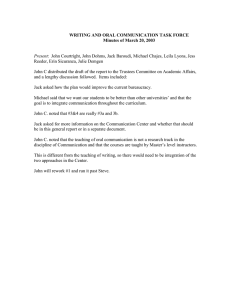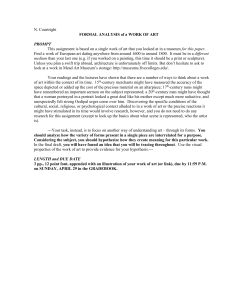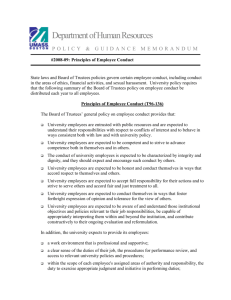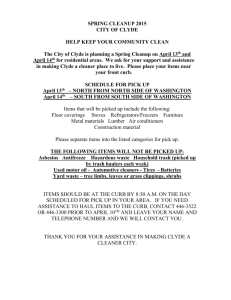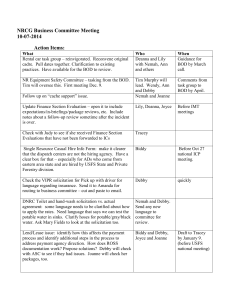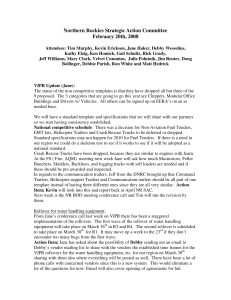Writing and Oral Communication Task Force Minutes of November 7, 2002
advertisement
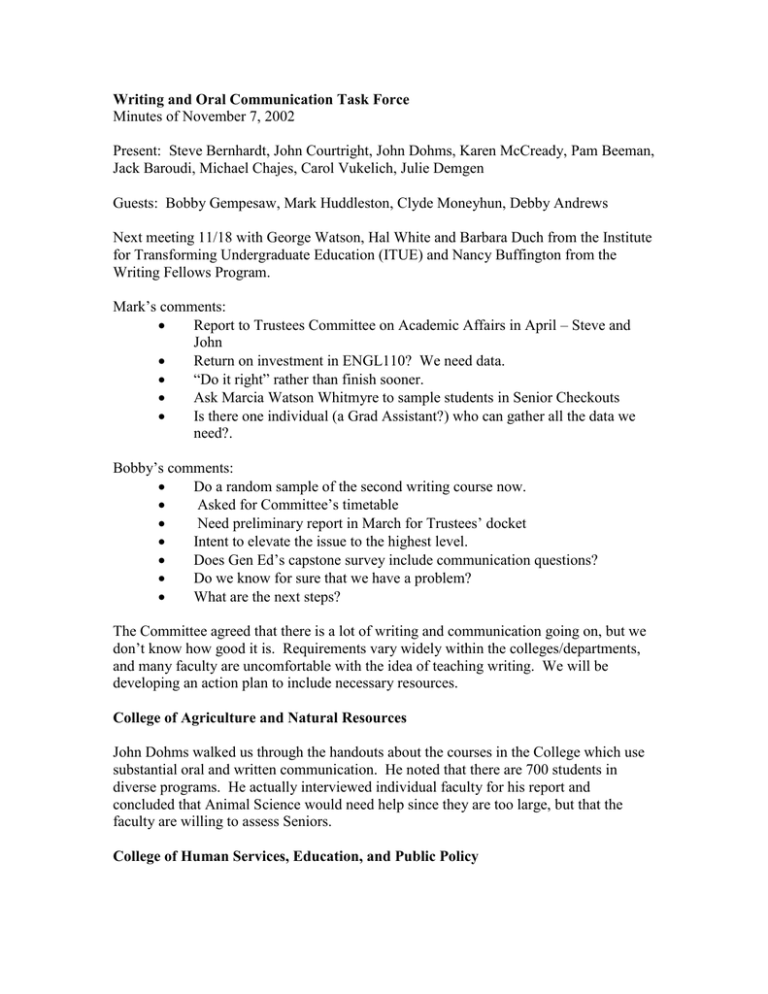
Writing and Oral Communication Task Force Minutes of November 7, 2002 Present: Steve Bernhardt, John Courtright, John Dohms, Karen McCready, Pam Beeman, Jack Baroudi, Michael Chajes, Carol Vukelich, Julie Demgen Guests: Bobby Gempesaw, Mark Huddleston, Clyde Moneyhun, Debby Andrews Next meeting 11/18 with George Watson, Hal White and Barbara Duch from the Institute for Transforming Undergraduate Education (ITUE) and Nancy Buffington from the Writing Fellows Program. Mark’s comments: Report to Trustees Committee on Academic Affairs in April – Steve and John Return on investment in ENGL110? We need data. “Do it right” rather than finish sooner. Ask Marcia Watson Whitmyre to sample students in Senior Checkouts Is there one individual (a Grad Assistant?) who can gather all the data we need?. Bobby’s comments: Do a random sample of the second writing course now. Asked for Committee’s timetable Need preliminary report in March for Trustees’ docket Intent to elevate the issue to the highest level. Does Gen Ed’s capstone survey include communication questions? Do we know for sure that we have a problem? What are the next steps? The Committee agreed that there is a lot of writing and communication going on, but we don’t know how good it is. Requirements vary widely within the colleges/departments, and many faculty are uncomfortable with the idea of teaching writing. We will be developing an action plan to include necessary resources. College of Agriculture and Natural Resources John Dohms walked us through the handouts about the courses in the College which use substantial oral and written communication. He noted that there are 700 students in diverse programs. He actually interviewed individual faculty for his report and concluded that Animal Science would need help since they are too large, but that the faculty are willing to assess Seniors. College of Human Services, Education, and Public Policy Carol reviewed the handouts from the various departments in the College and noted that all Teacher Education majors must pass Praxis I before practice teaching, and that our students’ mean scores are above State of Delaware requirements. Both Consumer Studies and Hotel Restaurant and Institutional Management curricula include lots of writing, and HRIM students also do lots of speaking. Writing Center Clyde distributed a handout regarding ENGL 110 and emphasized that new TAs do not teach sections until after they have a full year working in the Writing Center. He is rewriting the outcomes statement in the course description document. He questions whether all students need 110 – maybe we should try something else. (John Courtright would be willing to contribute money if this were done in a LIFE cluster.) Debby stated that post-110 outcomes are subjective and hard to measure, since writing sometimes blooms later on. She suggested that the Second Writing requirement stands in our way and that we need a change in perspective on the requirement. It is better and harder to write short than 3000 words, and Power Point is not writing, just lists. Get students to “think like a writer.” Committee concerns: Resource problem if you spread 110 around among the colleges Writing Center would be stretched thin ENGL110 evaluations vary by instructor Many freshmen like the small 110 classes because the teacher knows their name. Advantages Administration would support restructuring Writing Center would become consultation center
